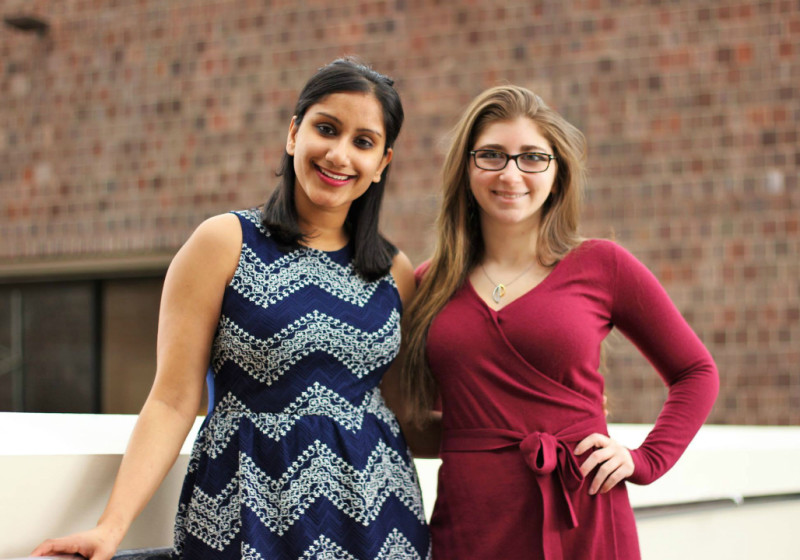Sofia Salen and Niru Murali withdrew their bid for Students’ Association (SA) President and Vice President late Saturday night, hours after the Campus Times reached out to them with evidence revealing they had campaigned on embellished resumes and misrepresented achievements.
In their letter of withdrawal, addressed to SA Senate Elections & Rules Chair Paul Jaquish and Deputy Chair Jake Braniecki and carbon-copied to a Campus Times editor, the duo cited “dirty campaigning and attacks” and the “adversarial environment SA Government has become” as their reasons for dropping out.
The evidence presented to the pair came from an exhaustive Campus Times investigation, spurred by an anonymous tip, which raised questions about Salen and Murali’s bid for the highest offices in SA.
In their now-defunct platform, Salen and Murali said they are set apart from other candidates by the positions they’ve held in SA Government.
But Salen has not held several of the positions she pinned to her resume, ones she had touted as credentials that qualified her for the Presidency not just in her platform, but on her campaign’s website, in interviews, and in last Wednesday’s debate.
And her running-mate, Murali, had misrepresented her role in work she claimed to have spearheaded as Executive Director for Student Life.
Salen
On her campaign website, Salen listed, as her own, conflicting titles in the same realm of SA, neither of which she has ever officially worn.
Despite adorning her record with the phrases “as the Director of Public Relations” and “the Associate Director of Public Relations,” she has in fact only ever held the title of Associate Director of Internal Public Relations, a role created because the cabinet department “needed a few things done that didn’t fall under one of the teams or for internal communication that we didn’t have,” according to SA Senate minutes from Oct. 26, 2015.
“I do know that Sofia was approved as Associate Director of Internal Public Relations,” Speaker of the Senate Ethan Bidna said when asked about Salen and her Senate-approved positions. “I have no knowledge of any other appointments or approvals.”
The Senate must approve all executive appointments, according to the Senate’s Policy and Procedure Manual.
In her campaign biography, under the heading of “Associate Director of Public Relations,” Salen said she cultivated a face for SA Government and oversaw communications to the student body. She said she did the same “as the Director of Public Relations” in her platform.
When asked about these discrepancies in an interview with the Campus Times staff, Salen struggled to answer, eventually saying that she was using the word “director” because it was an easier shorthand. She said that her title did not matter because she and actual Executive Director of Public Relations Saad Usmani—who is mounting a write-in campaign for the presidency after first launching a satirical one—shared the workload.
While Usmani confirmed that this was mostly the case, and said that Salen had been acting informally as an Associate Director since the resignation of former Executive Director Josh Anes midway through the school year, he said, “that’s a bit of an embellishment,” when shown this selection from Salen’s platform: “As the Director of Public Relations, Sofia cultivated the face of SA Government.”
When told of Usmani’s reaction and asked for a response during the same interview, Salen struggled again to answer, and Murali, seated next to her, offered a reply in her place.
Apart from her false titles, Salen said she has served on the SA Senate’s Elections & Rules committee, but never appeared on its roster.
Committee Chair Paul Jaquish confirmed that Salen has never served on the committee.
He said Salen “did serve on the Elections Task Force, a group that met six or seven times in the Fall of 2014 to discuss changing the rules for elections under the direction of Vanessa Sanchez and myself,” but emphasized that the committee and task force “are distinct groups with very different functions.”
In response to the Campus Times’ inquiry about this discrepancy, Salen claimed, again, that she “served on the Elections and Rules committee in the years 2014-2015 when I was a Senator At-Large and Vanessa Sanchez was the Chair and Paul Jaquish was Deputy Chair.”
Salen also said she served on the same body’s Academic Affairs committee, claiming she “reviewed the pre-major advising program,” but in reality was only a member for four weeks, absent from three of those four weeks’ meetings, and played little to no role in the committee’s review of that program.
Committee Chair and Senator Jordan Smith confirmed this, providing attendance records showing Salen absent for the committee’s Sept. 22, Oct. 13, and Oct. 20 meetings. She was present for the Sept. 29 meeting. The absences were marked as excused.
“We had begun to discuss pre-major advising by then but hadn’t done any real review of the materials, and she definitely didn’t contribute to that,” Smith said. “To say she reviewed the pre-major advising program is a pretty big stretch.”
Smith added that when she asked committee members to research other college advising programs for the Oct. 13 meeting, Salen both missed the meeting and never sent Smith any research.
Salen resigned from the committee on Oct. 24, after receiving an email from then-Chair Adrian Petrou about her attendance and then being tapped for her Internal Public Relations role.
“My involvement on the Academics committee was limited because soon after joining [SA President Grant Dever] asked me to join the Public Relations team, and there is a rule stating that one cannot be a member of both the Legislative and Executive Branches,” Salen said in response.
She said this was her reason for not completing Smith’s assignment, and that she was upset to leave the committee.
Murali
The same distance marked Murali’s campaign claims.
Her campaign platform says that, “as the Executive Director for Student Life, Niru spearheaded initiatives including […] a diversity citation for students’ diplomas,” but the chairs of the Academic Affairs committee, which has been working on the citation for several months, and the Executive Director for Academics, who works with the committee, maintain that she’s had scarce direct involvement at all.
The diversity citation would function similarly to the University’s Citation for Achievement in College Leadership, the completion of which adds a special notation to a student’s transcript.
“As far as I’m aware, Niru has had no involvement whatsoever in this project,” Deputy Chair Craig Campbell, who asked Murali at the debate how she had coordinated the citation, said. “You can imagine my surprise when I read on Niru’s platform that she spearheaded the initiative.”
Campbell explained that the project was put on the committee’s agenda in January, and members have been researching, drafting proposals, and writing a report since then. SA documents show Smith coordinating the effort.
“This has been the work of several committee members, including myself, Senator Andria Rabenold, Senator Dan Matthews, and Legislative Advisor John Lisi,” Campbell said.
Smith also disputed Murali’s contention that she spearheaded.
“She may have discussed it with Erinmarie [Byrnes], our Executive Director, as a thought, but as far as I know, she hasn’t been involved at all,” she said. “That’s been strictly Academics, and we started working on it a few months ago.”
When asked about this possible conversation with Murali, Byrnes—who is running for SA President with Matthews—provided the Campus Times with screenshots of emails and documents showing a timeline of Murali’s involvement with the citation program.
She said she doesn’t think Murali spearheaded the project, either.
In a later interview, Smith recalled the emails, acknowledging that Murali had had more involvement with the program than she initially thought, but stood by her claim that Murali was stretching the truth about spearheading the initiative.
The trail shows that Murali played a short-lived part in the project, eventually asking to be occasionally updated on its progress, though she did draft the original document containing the idea.
Her contribution, as well, seems to have been come as a breach of her scope of power, despite her claims that SA leadership—she didn’t remember who—allowed the activity.
On Jan. 13, Murali created on a brief document saying, “We believe it would be effective to create a ‘diversity/intercultural competence’ citation,” and listing several suggested requirements for such a citation. In comments on the document, she was asked whether she was working with the Academic Affairs committee, to which she replied that she would share the document with Smith and Byrnes.
On Jan. 14, Murali shared the document with Smith and Byrnes. In emails over the next two days with other SA officials, Murali said she had talked “in passing” to a senator who was interested in writing a resolution about the diversity citation, asked if it would be okay for the senator to work on it, was told yes, and then was told that “this is all academics” by Bidna.
Murali replied, “Can y’all please update me as progress is made? This is a project I’m especially passionate about and I’d just appreciate occasional updates.”
Byrnes told the Campus Times she thinks that Murali “has really awesome ideas that she gets very passionate about, but that she frequently oversteps her departments, and doesn’t have a clear understanding of how the process of SA Government works.”
She emphasized that she did not want to be perceived as attacking Murali.
“The job of an Executive Director, and particularly the President and Vice President, is to ensure the correct execution and implementation of projects in the correct departments,” she continued, citing another example, documented in a screen-captured email, of Murali apologizing for trying to liaise with an administrator outside her domain.
“It also concerns me that Niru thought she could draft a Diversity Citation without talking to anyone or doing any background research,” Byrnes said. After listing the extensive measures the Academic Affairs committee has taken regarding the citation, she said that “his project requires a more complex response than how Niru first handled it.”
Murali, when asked via email for a response to the claims against her, admitted she didn’t spearhead the diversity citation.
“I actually just came up with the idea and needed a synonym for ‘came up with’ to use in my platform,” she said. “So that is definitely my honest mistake and I apologize—the Academic Affairs committee has been hard at work and I’m not taking any of that credit.”
She also acknowledged that she has overstepped her bounds as Executive Director for Student Life several times, which she said stemmed from the her and others’ adjustment to SA’s new Bylaws this year.
“It took me a while to navigate the Bylaws but I did try to fix any mistakes I made,” she said. “I apologized for overstepping my bounds because that’s what a decent human being does after they’ve realized they’ve made a mistake.”




